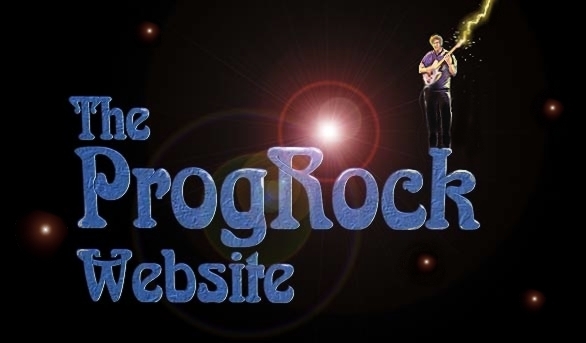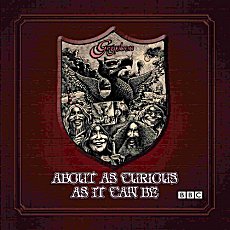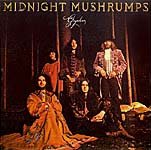Gryphon was (or should be IS, as they have reformed), one of the most unique and evolving progressive bands. Their distinctive style and blend of early music, folk-rock and instrumentals appealed too all ages the albums became solid sellers both in the UK and abroad. With only five albums between 1973 and 1977, they changed from a medieval music quartet to an electronic progressive pop band.
In 1971, Richard Harvey, a master recorder player/keys, and Brian Gulland, (crumhorn/bassoon) and Graeme Taylor (guitars), formed a band called Spelthorne. A year later, percussionist/singer David Oberlé joined, and the band changed its name to Gryphon.
In 1973 their album appropriately named- Gryphon was released. Combining acoustical, medieval and renaissance tunes, traditional English folk music and original compositions, the band featured the virtuosity of Harvey's lightening fast recorder work.
Midnight Mushrumps (my favorite Gryphon album), came out in 1974 with an additional member- bassist Philip Nestor. Gryphon started to add electronic instruments and original compositions to their medieval-folk sounding mix. `Midnight Mushrumps,' a dynamic 19-minute title track, included subtle use of synthesizers with the amazing tapestries of bassoon and recorder. `The Ploughboy's Dream,' was the last traditional `folk song ever recorded by the band.
Red Queen to Gryphon Three, their next release, was much more rock-oriented than its predecessors. With its greater use of synthesizers and electric guitars, this all-instrumental album consisted of four lengthy compositions and was the only Gryphon album originally released in America.
Gryphon opened up for the progressive band Yes, late 1974 with a new bass player- Malcolm Bennett ( Bennett, later appeared on Steve Howe's 1975 solo album, Beginnings.) They even appeared on the King Biscuit Flower Hour radio concert series.
Gryphon recorded Raindance in 1975. Although the album included a lengthy classical-styled piece by Richard Harvey, "(Ein Klein) Heldenleben," the band started to turn towards in a more commercial direction. They even covered a Beatles song on the album- "Mother Nature's Son."
In 1977, Gryphon went through many changes, Bennett didn't last long and was replaced by Jonathan Davie. Graeme Taylor, who left to join Ashley Hutching's Albion Band- he was replaced by Bob Foster. Oberle become the vocalist, so they added drummer Alex Baird. To help with the lyrics (ala Betty Thatcher with Renaissance), the band hired lyricist- Tim Sebastion. The album is a mixture of pop and progressive Yes-type music. Medieval instruments are restraint or missing. The best song on the album is clearly Harvey's Yes-inspired "Spring Song."
Richard Harvey is now, of course, better known for his feature film and TV drama scores, but at age 21, he released a solo album- `Divisions on a Ground,' consisting of baroque recorder pieces. He has recorded many more classic recorder albums and was the guest recorder soloist for Jim Henson's daring- `The Dark Crystal.' Harvey played on Gordeon Giltrip's `the Peacock Party,' (with Prog musicians such as: Ian Mosley (Marillion/Hackett), Morris Pert (Brand X), etc. He can also be heard on albums by Kate Bush, Enya, Mike Heron, Richard and Linda Thompson. He has also worked with many performers including Elvis Costello. Recently, he has scored many film soundtracks.
Richard partnered up with Hans Zimmer to contribution to the score of 'The Da Vinci Code'. He also penned the Thai epic, 'King Naresuan - The King who dared to change the destiny of a nation'.
Brian Gulland joined the French folk group Malicorne and concentrated on early music and film scores. He also owns and manages Gullwing Studios - a quality mobile recording facility in North Wales. Gulland is currently providing vocals, bassoon, flute, oboe (and other assorted instruments), in- The New Scorpion Band, an acoustic folk band, performing traditional music from Britain and Ireland. Concerts of the band include mastery of over 25 instruments and 5 voices.
Graeme Taylor formed various incarnations of the Albion Dance Band, then left to forma band called- Chapter 11, soon renamed to- The Home Service. In the 90's Graeme played live with Home Service (some of the gigs lead to the live album- `Wild Life.') In March 1995 Graeme played on Ashley (Albion Dance Band), Hutchings' fifty years birthday, which lead to the release of `The Guv'nors Big Birthday Bash.' In 1996 & 1997 he played with John Kirkpatrick Band. Graeme is currently playing as backing for both John Tams and Rolf Harris. In 1987, he acted in the movie- `Cry Freedom'
Dave Oberle become an advertising manager for the Heavy Metal magazine Kerrang and produced various hard rock bands.
Hux Records is releasing a live Gryphon album recorded from two concerts which the band recorded for BBC Radio 1 on 3rd May 1974 and 13th November 1975.
The album will be entitled: `About as Curious as It Can Be,' and will be released March 25, 2002. The CD will include udes many rare photographs, taken from the band's own archive, and liner notes by Gryphon former guitarist, Graeme Taylor.
 Richard Harvey just recorded an album with guitar maestro- John Williams entitled- `Musoc Box.' It explores the sound of the guitar in traditional and contemporary African music. Williams is joined by fellow musicians Chris Laurence, Paul Clarvis, John Etheridge and Richard Harvey, who plays: clarinet, bass clarinet, accordion, tiple, zampoñas, dulcimer, bass flute-a-bec, whistles, Indian bamboo pipe, sub-contra flute-a-bec, Indian harmonium and Malagasy flute.
Richard Harvey just recorded an album with guitar maestro- John Williams entitled- `Musoc Box.' It explores the sound of the guitar in traditional and contemporary African music. Williams is joined by fellow musicians Chris Laurence, Paul Clarvis, John Etheridge and Richard Harvey, who plays: clarinet, bass clarinet, accordion, tiple, zampoñas, dulcimer, bass flute-a-bec, whistles, Indian bamboo pipe, sub-contra flute-a-bec, Indian harmonium and Malagasy flute.
 In 2003 Hux Records released another gem of a live album- `Glastonbury Carol' which was a live recording with the exception of the title track- Glastonbury Carol- which is a song commissioned for the closing titles of the film- "Glastonbury Fayre", (1973), and was always one of the band's favourites. Released as a single, the song was lost and forgotten for 30 years until it was `discovered.' While the 2002 released live album is mostly, instrumental; `Glastonbury Carol' has many of the classic Gryphon vocals on this CD. Bravo Hux, any more gems?
In 2003 Hux Records released another gem of a live album- `Glastonbury Carol' which was a live recording with the exception of the title track- Glastonbury Carol- which is a song commissioned for the closing titles of the film- "Glastonbury Fayre", (1973), and was always one of the band's favourites. Released as a single, the song was lost and forgotten for 30 years until it was `discovered.' While the 2002 released live album is mostly, instrumental; `Glastonbury Carol' has many of the classic Gryphon vocals on this CD. Bravo Hux, any more gems?
In 2007, rumors have been buzzing that Gryphon would be reforming and working on a new album and in September, the Gryphon reunion is a go.
Richard Harvey, Brian Gulland, Dave Oberlé, Graeme Taylor and latter-day bass player Jon Davie, was supposed to make a new album, but no news of this has been released.
 Graeme Taylor writes: "There is now (or extremely soon) a form on the gaudela Gryphon website to express interest in an Autumn reunion concert in London. Vocal recordings with Dave Oberlé hve started for a serious track under the working title- Blood Runs Cool.
Graeme Taylor writes: "There is now (or extremely soon) a form on the gaudela Gryphon website to express interest in an Autumn reunion concert in London. Vocal recordings with Dave Oberlé hve started for a serious track under the working title- Blood Runs Cool.
The re-union concert was held on Saturday 6th June at The Queen Elizabeth Hall in London. Two songs from the show were released on youtube (with no zoom).
In September 2007, Gryphon announced on their website that they had finally decided to produce a new album after a silence of thirty-one years. They also suggested the possibility of a one-off live performance in London, which finally occurred on 6 June 2009 at the Queen Elizabeth Hall, London, thirty-two years after their last performance. The four original members - Richard Harvey, Brian Gulland, Graeme Taylor and Dave Oberlé - opened the evening with a selection of songs and instrumentals from the first album Gryphon. They were then joined by Jon Davie (the final bass player, who appeared on Treason) and a new member, the multi-instrumentalist and film/production music composer Graham Preskett for the rest of the evening.
A follow-up tour was postponed, but the band eventually played six dates in Spring 2015,with further dates in 2016 including Fairport Convention's Cropredy Convention and a return to Union Chapel Hall.
In the spring of 2016, it was announced that Richard Harvey was leaving the band due to a cramped schedule. Shortly after, Gryphon gained two new members: Keith Thompson on woodwinds and Rory McFarlane on bass.
A new album, ReInvention, will be launched in September 2018.
Musicians:
Current Members
Brian Gulland (born 30 April 1951, in Maidstone, Kent) — bassoon, trombone, crumhorn, recorder, keyboards, vocals (1973-1977, 2009, 2015–present)
Graeme Taylor (born 2 February 1954, in Stockwell, South-west London) — guitars, vocals (1973-1975, 2009, 2015–present)
Dave Oberlé (born 9 January 1953, in Farnborough, Kent, now part of London) — drums, percussion, lead vocals (1973-1977, 2009, 2015–present)
Graham Preskett — keyboards, mandolin, violin, guitar, percussion (2009, 2015–present)
Rory McFarlane — bass (2016–present)
Andy Findon- winds and reeds (2017-present)
Albums
Gryphon (1973)
Midnight Mushrumps (1974)
Red Queen to Gryphon Three (1974)
Raindance (1975)
Treason (1977)
ReInvention (2018)
All albums were released by Transatlantic Records, except Treason, which was released by EMI/Harvest Records.
Single
Spring Song / The Fall of the Leaf (UK 1977)
Compilations and other releases
The Collection (1991)
The Collection II (1995)
About as Curious as It Can Be (2002) - 1974 & 1975 BBC Radio session performances
Glastonbury Carol (2003) - 1972 & 1974 BBC Radio session performances plus the title track, theme music for the Peter Neal film Glastonbury Fayre about the 1971 Glastonbury Festival
Crossing the Styles: The Transatlantic Anthology (2004)



